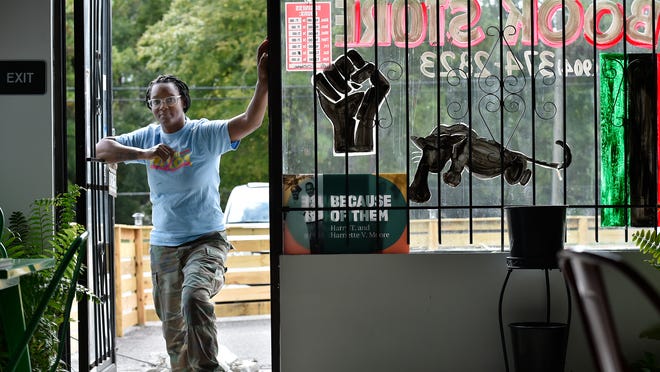In sociology, “the third place” often refers to a social environment apart from the home or workplace. In Jacksonville, this third place is often one of the city’s local businesses which strive to foster a sense of community for the neighborhoods they’re in.
Cafe Resistance is the latest in a line of Black-owned businesses aiming at creating unique spaces for the community.
State Rep. Angie Nixon opened her bookstore and coffee shop almost three months ago after she was inspired to improve accessibility to books in the community.
Cafe Resistance aims to “teach people history, particularly Black history, and offer up space for marginalized voices that are seeing challenges,” Nixon said. The store has a diverse selection of books, including many that have been banned from schools by state legislature.
![Moses Evans, the band director at Highlands Middle School, works with Demarcus Lee, 7 and Royal Wilson, 10 as they learn to play the xylophone during free music lessons given by Evans at Cafe Resistance Wednesday, September 4, 2024. Angie Nixon has opened Cafe Resistance, a community space on Soutel Drive for members of Jacksonville's African-American community to gather for community meetings, have a cup of coffee, bring children to read, and also offers free music lessons for children. [Bob Self/Florida Times-Union]](/gcdn/authoring/authoring-images/2024/09/06/NFTU/75105496007-jki-090424-cafe-resistance-05.jpg?width=660&height=445&fit=crop&format=pjpg&auto=webp)
“It’s going to allow people to learn more and be exposed to ideas and different cultures and different things in general,” Nixon said. “I just want to empower people.”
But, more than that, she said she wanted it to be a welcoming place for children and their parents, which is why it was important to include a cafe and offer healthier food options “in an area where there is a lot of fast food and food insecurity,” she said. The cafe menu includes salads and sandwiches in addition to coffee.

The store is partly a community hub, Nixon said. This includes partnering with a health organization to offer informational sessions on diabetes, heart health and mental health.
Nixon said students can get free tutoring and free music lessons at the store as well.
“Everytime people come in and look around, they’re like, ‘This is so nice,’” Nixon said. “We deserve nice things in Northwest Jacksonville. The community is used to less, and we deserve better, and we’re trying to do better for the community.”

In Springfield, another cafe is hoping to introduce its own new programs in the next few months.
Shandon Benjamin, owner of 1 Foxy Lady Cafe and Catering, is a Jacksonville native who said she used to entertain at home with full-fledged spreads before people started asking if she could do dishes specifically for them. From there, her catering business began in 2015, and she opened a brick-and-mortar shop in 2017.
“I am so humble and grateful for the support — be it during the pandemic, now or in the beginning stages,” she said. “It encompasses a lot of [the community] feeding back into us and pouring back into us.’

Benjamin said she’s been hoping to do the same by becoming a foundation for up-and-coming business owners. With a focus on baking and small culinary businesses, she said she has been mentoring two businesses unofficially already and plans to start a program at her cafe to expand what she can do to support those around her.
“It’s not easy to open a business, with the paperwork and especially if you’re working full-time,” she said. “I didn’t have a culinary mentor. It made me realize I don’t want to keep my mistakes to myself. I want to share them so others don’t make those mistakes.”
Over the years, the cafe has served as a gathering place for the Springfield and North Pearl Street residents in particular, but after the pandemic, Benjamin said she had to adjust what she offered for people to congregate.
“We try to draw people in and keep the atmosphere going,” she said. “We do pop-up shops — workshops, candle-making classes and boutique pop-ups. We’re still here, still in business, and just trying to keep business flowing and in the community.”
Benjamin described it as “the kind of community where the person who cuts our lawn will do it for a piece of cake that I leave out for him” and said she hopes everyone in Springfield is able to thrive.
![Inside Cafe Resistance Wednesday, September 4, 2024. Angie Nixon has opened Cafe Resistance, a community space on Soutel Drive for members of Jacksonville's African-American community to gather for community meetings, have a cup of coffee, bring children to read, and also offers free music lessons for children. [Bob Self/Florida Times-Union]](/gcdn/authoring/authoring-images/2024/09/06/NFTU/75105495007-jki-090424-cafe-resistance-10.jpg?width=660&height=440&fit=crop&format=pjpg&auto=webp)
Ensuring businesses like Nixon’s and Benjamin’s continue to thrive in Jacksonville is what motivates Ru Miles, founder and digital content creator for Market and Mimosas and freelance social media liaison.
Miles, a Black business owner in the digital space, said her content started taking off in 2021 when pandemic uncertainty started to fade.
“We thought it would be really nice to start a group and community for people who wanted to meet up,” she said. “I would get connected with these businesses and hear their stories.”
A Jacksonville native, Miles said the pandemic created a fear in her that the city would slide back on its progress of the last five years to be a “young, cool, hip area,” that it was blossoming into.
“I wanted to see people getting back out,” she said. “There are a lot of natives who are so close to the city and have seen it grow and what it was in 2001 to now what it is in 2024.”

Miles started hosting different gatherings at coffee shops and other businesses to promote and work with business owners to boost their profiles and highlight the ways they contribute to the community. She said encouraging interaction, especially during that time after COVID, was important to her.
Maintaining that sense of community “brings attainability to the [city],” she said.
“Once you see people doing it, it makes it more accessible and opens that door,” Miles said. “Seeing Black-owned businesses be successful in Jacksonville shows other Black people that they can own a business and be successful here.”
Being in the business of supporting other businesses has forged a community on the digital landscape for Miles and for other content creators and brick-and-mortar owners who congregate there.
“Jacksonville has so much growth available to it, and I hope it’s universal,” Miles said.



